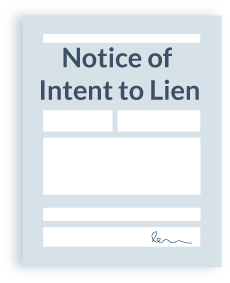
Properly securing, perfecting, and enforcing mechanics lien rights can be a complicated and daunting task, specifically when it comes to deadlines. Not only are lien laws strictly enforced, but because of how complicated these laws can be, there’s a lot of misconceptions out there. A recent Court of Appeals case helped clarify that Illinois claimants need not wait 10 days after serving notice to file their lien claim.
Illinois mechanics lien notice requirements
Illinois mechanics lien law doesn’t have a traditional preliminary notice requirement (with the exception of single-family, owner-occupied, residential projects). Although we always recommend sending a preliminary notice, whether it’s required or not.
Instead, Illinois requires a notice of intent (NOI). Instead of being “preliminary” (i.e. sent at the outset of the project) this notice is required to be sent within 90 days of last furnishing labor or materials to the project. The requirements for this notice can be found under 770 ILCS 60/24, and the requirements are pretty straightforward.
In addition to sending this notice within 90 days, the general conception is that the claimant must then wait 10 days to file a mechanics lien claim. This is absolutely the rule in other states, but what about Illinois? Do you need to wait 10 days after serving a notice to file your claim? Yes and no.
Let’s take a look at a recent Illinois Court of Appeals case to clear things up.
Court clarifies timing between 90-day notice, filing a claim, and enforcing a claim
The case in question is Matteo Construction Co. v. Teckler Blvd. Dev. Site, LLC.
Project Snapshot:
- Owner: Teckler Blvd. Development Site, LLC (Teckler)
- Subcontractor: Matteo Construction Company (Matteo)
The facts in this case are as basic as they come. Matteo was hired as a subcontractor on a project owned by Teckler.
As you can probably imagine, a payment dispute eventually arose. So on February 23rd, Matteo sent Teckler a copy of the lien claim they intended to file. Two days later, Matteo recorded the claim of lien, and a copy of the recorded lien was received by the owner on the following day, February 26th.
Finally, on June 1st, Matteo filed an action to foreclose their mechanics lien claim.

Send a Notice of Intent to Lien for Free
Send a Notice of Intent to Lien with Levelset. We’re the NOI experts. With us it’s fast, easy, and done right. And it’s free.
Owner challenges lien for failing to wait 10 days to file
In response, Teckler filed a motion to dismiss the claim, based on the fact that Matteo didn’t wait 10 days from the notice to record their lien claim, as required by 770 ILCS §60/28.
(The notice was also challenged because it was merely a copy of the claim, but the court determined it still contained all of the required information and service requirements.)
The trial court agreed with Teckler, stating that since 10 days hadn’t passed between the notice and the filing, the claim wasn’t “perfected.” Matteo appealed.
On appeal, Matteo admitted that the claim wasn’t filed 10 days after the notice was served, but they did wait more than three months to file a foreclosure action. The Appeals Court turned to the language of the statute (§60/28) itself:
“If any money due to laborers, materialmen, or sub-contractors be not paid within 10 days after his notice is served as provided by sections 5, 24, and 25, then such person may file a claim for lien or file a complaint to enforce within the same limits as to time and in such other manner as hereinbefore provided for the contractor in section 7 and sections 9 to 20 inclusive, of this Act…”
Illinois claimants must wait 10 days to file OR enforce a lien
After reviewing the statute, the court made short work of this dispute by citing two previous cases where a sub recorded their lien claim and served notice on the same day.
In both cases, the owner attempted to dismiss the claim based on the failure to comply with Section 28. Here’s what the courts had to say (emphasis ours):
“Section 28 of the Act addresses the requirements for the recording and enforcement of liens and not notice. It does not require that section 24 notice predate recording by 10 days after notice if payment has not been made.
“Plaintiff filed its lien and sent notice to [defendant] on February 19, 1987. It then filed its complaint to enforce its lien on October 13, 1987, more than 10 days after notice to [defendant]. Therefore, plaintiff has complied with section 28 of the Act. Section 24 does not impose any timing requirements for the giving of notice vis-a-vis recording of the lien.”
The holdings in the two cited cases are consistent with the language of section 28. A strict reading of the statute provides timing limitations using the term “or.” Specifically, if a subcontractor is not paid within 10 days after serving notice, it may file a claim for lien “or” file a complaint to enforce its lien. Therefore, claimants can choose to either record their lien OR enforce their claim after 10 days of sending notice.
Thus, the trial court’s decision dismissing the claim was reversed.
IL claimants must wait 10 days to file claim OR enforce their claim
Or means or: That’s literally a quote from the court!
Ultimately, there are two different alternatives under the 10-day rule. In the case at hand, Matteo opted for the second alternative by filing their suit to enforce the lien after 10 days had expired.
Not only that, but Illinois mechanics lien laws specifically state that a “contractor may file its claim any time after the contract is made.” So if the rule was that a a claim can’t be filed until at least 10 days after notice, that provision would be irrelevant.
This is a prevalent misconception regarding Illinois mechanics liens. Failing to wait 10 days isn’t necessarily fatal to your claim. This may seem minor, but it’s an important distinction to make.
Granted, it’s best practice to send the notice well before filing, so the owner has some time to resolve the matter, and to address issues that may arise with the Contractor’s Sworn Statement. However, if pressed for time or dealing with a particularly uncooperative owner or GC, there’s nothing stopping a claimant from getting their notice served and their claim filed within a few days.